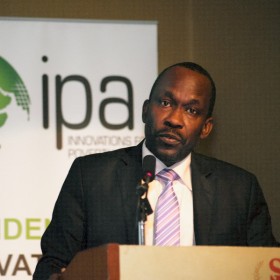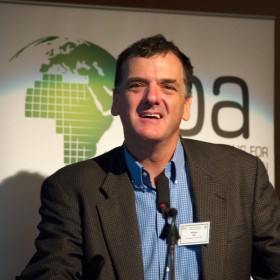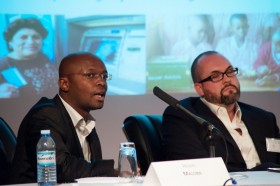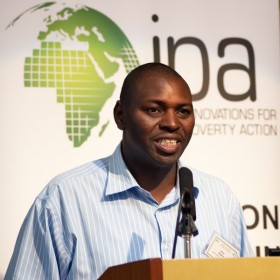Evidence on Innovations in Savings and Payments - Conference and Research Methods Workshop
On June 24 - 25, 2013, the Yale Savings and Payments Research Fund, under the Financial Inclusion Program at Innovations for Poverty Action, hosted a conference around evidence on innovations in savings and payments research in Kampala, Uganda.
The event showcased results from recent evaluations in Africa on child and youth savings, the impact of reducing cost barriers to saving among the poor, behavioral impediments to saving, using mobile phones for behavioral change, and the adoption and impact of mobile money. With over 180 attendees on Day One and close to 160 attendees on Day Two, the conference facilitated discussions between researchers, practitioners, and policymakers on the current body of evidence around financial inclusion for the poor, and which innovations in the design and delivery of financial products work best in positively impacting the welfare of poor households and enterprises in sub-Saharan Africa.
Conference Booklet

Opening Keynotes
Session 1: Child and Youth Savings

Session II: Cost Barriers in Accessing and Using Savings

Impact of Access to Savings - Kenya
Aaron Dibner-Dunlap, Innovations for Poverty Action
presentation - video - academic paper - project summary
The Cost of Convenience? Transaction Costs, Bargaining Power, and Savings Account Use - Kenya
Simone Schaner, Dartmouth College
presentation - academic paper - project summary
Discussants:
Fred Matovu, Lecturer, School of Economics, Makerere University
Nkonwa Joseph Zabasajja, Program Manager, MAMIDECT SACCO

Session III: Behavioral Barriers to Saving
Commitments to Save: A Field Experiment in Rural Malawi - Malawi
Jessica Goldberg, University of Maryland
presentation - video - academic paper - project summary
Why Don't the Poor Save More? Evidence from Health Savings Experiments - Kenya
Aishwarya Lakshmi Ratan, Yale University and Innovations for Poverty Action
presentation - video - academic paper - project summary
Impact of Village Saving and Loan Groups: Findings from the Saving for Change Program - Mali
Bram Thuysbaert, Yale University and Innovations for Poverty Action
presentation - project summary
Panel: Future Directions for Financial Inclusion in Africa
(Video)
William Jack, Georgetown University
Fabian Kasi, Managing Director, Centenary Bank
Sean Krepp, Country Director, Grameen Foundation Applab Uganda
Rossana Ramirez, Director, Youth Microfinance, Freedom From Hunger
Moderator: Aishwarya Lakshmi Ratan, Yale University and Innovations for Poverty Action
Mobile Banking in East Africa: Setting the Stage
Mobile Banking in Uganda and Tanzania: Use, Barriers, and Opportunities
Anastasia Mirzoyants, Senior Associate Director, InterMedia Africa
presentation - video
Session IV: Mobile Financial Services and Behavior
Getting to the Top of Mind: How Reminders Increase Saving - Bolivia, Philippines, and Peru
Dean Karlan, Yale University and Innovations for Poverty Action
presentation - video - academic paper - project summary
Risk Sharing and Transaction Costs: The Impact of M-Pesa - Kenya
William Jack, Georgetown University
presentation - video - academic paper
Discussants:
Henry Maloba, Project Director, Applab Money Accelerator, Grameen Foundation Applab Uganda
Mark Pickens, Director, Emerging Market Solutions, Visa, Rwanda
Session V: The Impact of Mobile Money
Closing Remarks
Research Methods Workshop on Experimental Design for Savings and Payments Research
In conjunction with the conference presenting Evidence on Innovations in Savings and Payments, the Yale Savings and Payments Research Fund hosted a three day research methods workshop for 16 competitively selected researchers from across African institutions on June 20 – 23, 2013. During the workshop, the researchers learned about randomized evaluations and thought critically about how to apply this research method to answer policy-relevant questions in their own country contexts. Participants were encouraged to develop their own research ideas, applying the methods and concepts learned over the three days. At the end of the workshop, the researchers presented ideas that they had developed in groups, and received feedback from experienced researchers with an expertise in this field. For more information on the workshop, please click here.
This event was organized in collaboration with:













